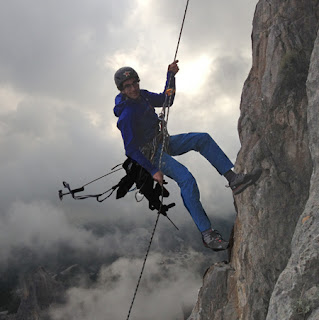Andrew Bisharat wrote an excellent article about the entire hoopla, but to me there are really only 2 interesting issues/questions, both of which matter to climbers around the world.
- Who gets to add fixed gear to the rock?
- Who gets to remove it?
Unlike kayaking, winter sports, and ice climbing, rock climbing is played upon a single-use canvas. For that reason, any alterations to that canvas need to be viewed with caution. The historical precedent has been that anyone has the right to create a route (and fix whatever hardwear they see fit) as long as they begin in at the bottom. All those to repeat such climbs have needed explicit permission from the first ascentionists before adding or removing original gear from a route. This is about as close to a universally-accepted principle as climbing has, yet it's still routinely violated. And often the fallback argument for those on either side of a given incident, is the idea that some behavior violates the "local" ethic.
This idea was central to the fight over chopping bolts on Cerro Torre's compressor route, it was central to the views of Index climbers regarding the existence of anchors on Japanese Gardens, and it even get brought up regarding disputes over the publication of guidebooks and magazine articles.
The problem with this Portlandia-esque obsession with localism: nobody ever defines a local. Try it. You'll fail
Until someone can provide an actual definition of a local, the use of "local ethics", "local opinion" or any similar cliche will remain meaningless and counter-productive to answering the two important questions above. It will only serve to counteract one of the most appealing aspects of climbing, the sense of connection to folks in new places, new cultures, new countries, etc. I don't care if someone lives 5 miles or 500 miles from a peak, or if they have lived somewhere for 10 months or 10 years, public land is equally all of ours. If climbers from Bishop, Boston, and Berlin all camp together for a month in Indian Creek, does one of them have some sort of monopoly on visiting the hidden walls or rap-bolting the featured aretes? Attempts to create a "locals vs visitors" / "us vs them" mentallity produce malice and place one ultimately on the losing side of a trend toward greater travel, more far-flung visitation, the end of "secret crags" and wider-dissemination of information once exclusively the domain of area veterans.

No comments:
Post a Comment